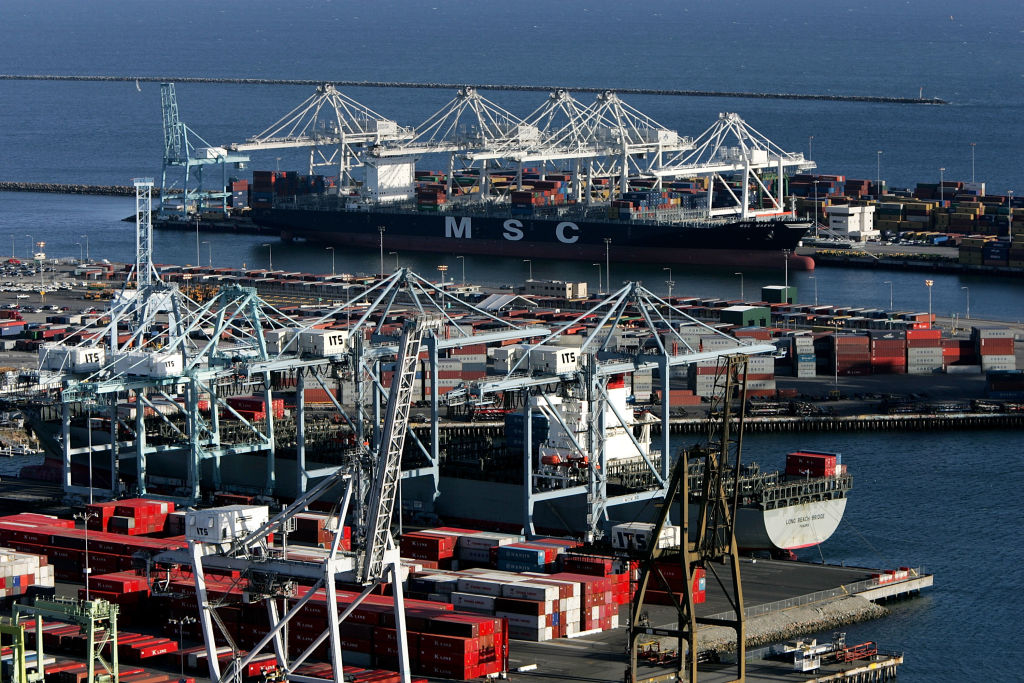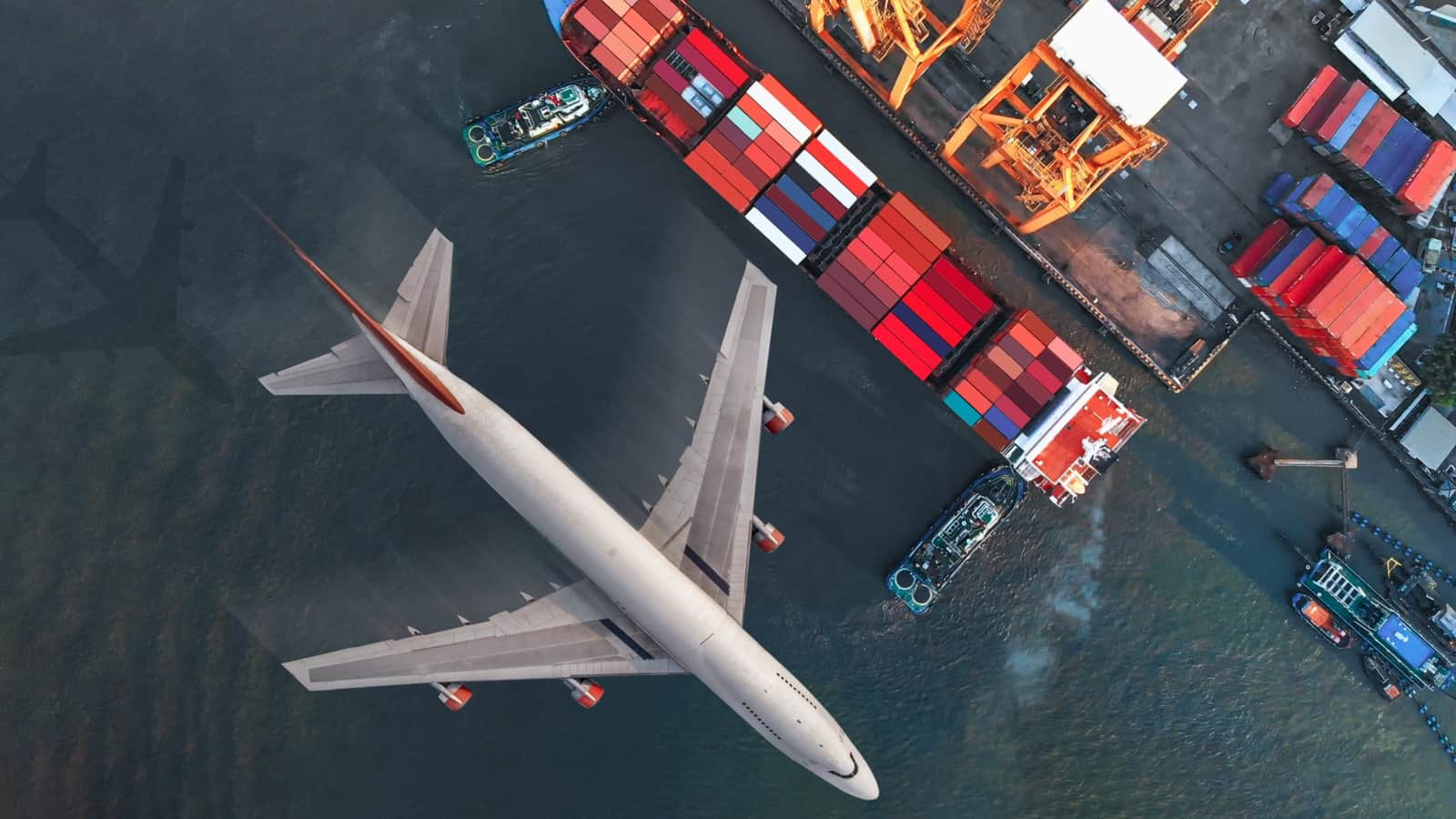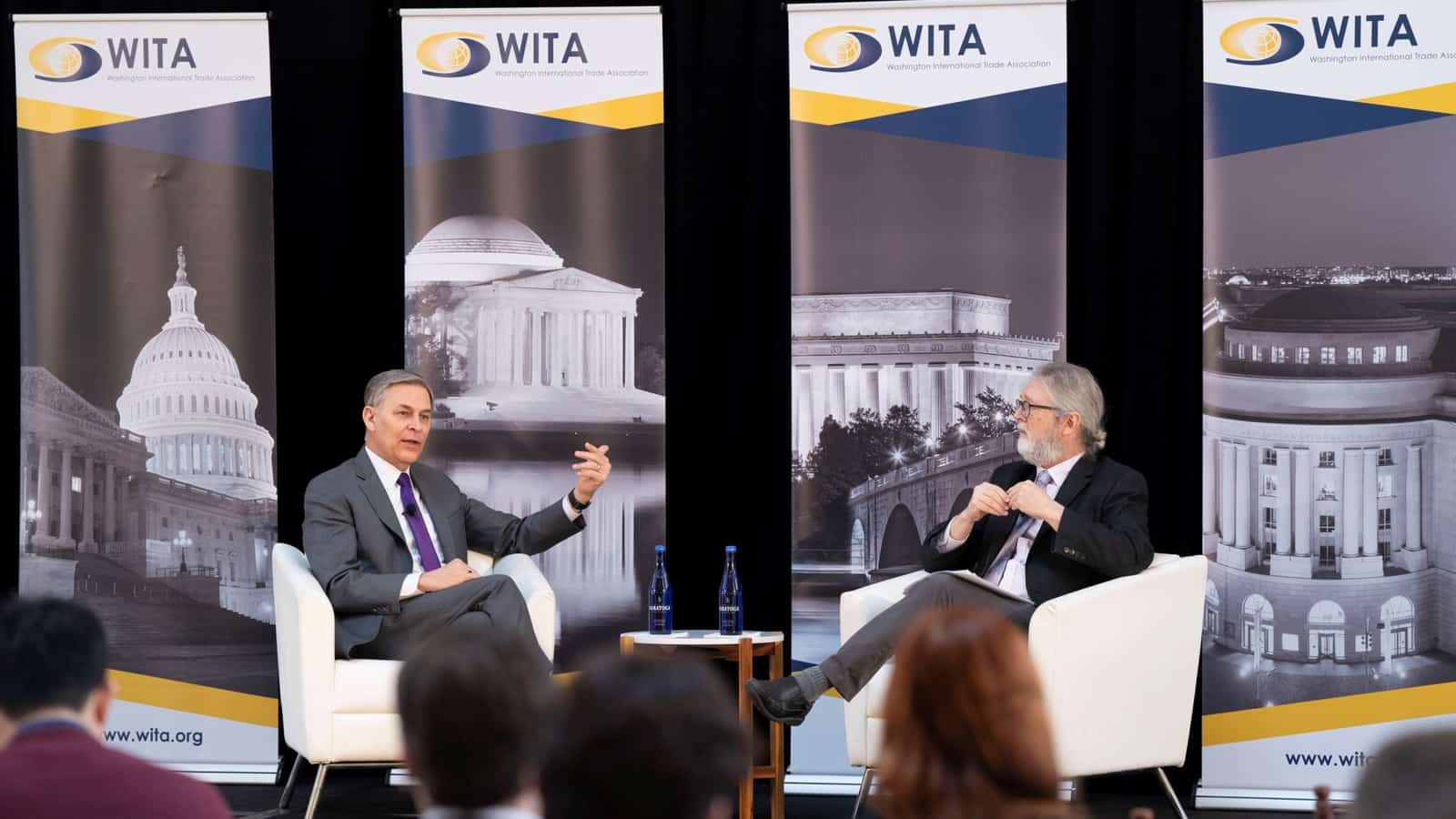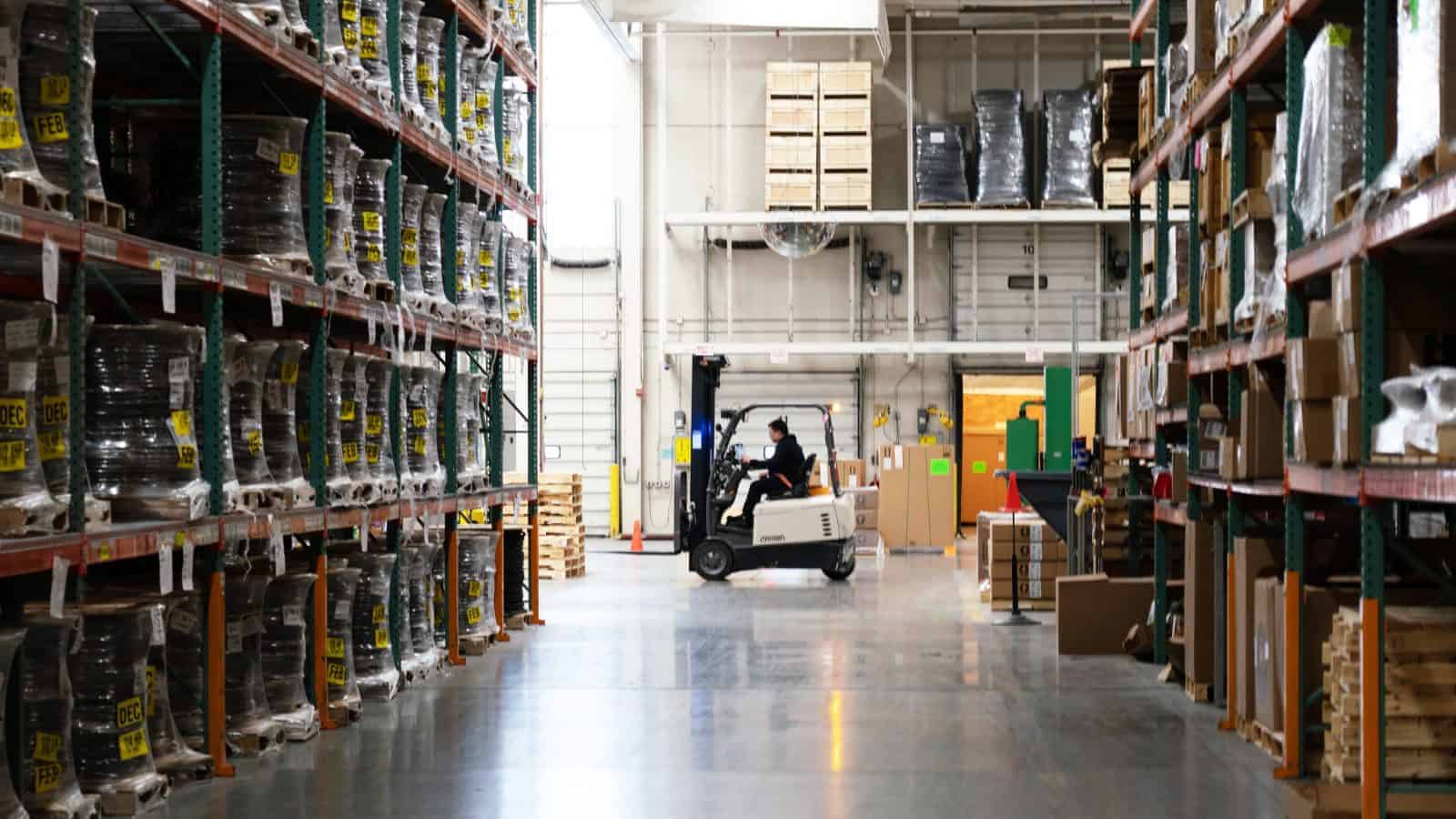NAM to White House: Stand Up for U.S. Businesses, Workers

The Office of the U.S. Trade Representative must revise its digital trade policy now to reassert American leadership, the NAM and more than 40 industry partners told the Biden administration ahead of U.S. Trade Representative Katherine Tai’s testimony this morning before the House Committee on Ways and Means.
What’s going on: In the past few years, the USTR has “retreat[ed] from digital trade protections,” the groups told National Security Adviser Jake Sullivan and National Economic Council Director Lael Brainard. Problematic actions/items by the USTR include:
- The October 2023 withdrawal of longstanding U.S. World Trade Organization positions that support the protection of cross-border data flows, stop data localization requirements, end discrimination against U.S. firms and their goods and services and protect sensitive data from bad actors;
- Abandonment of core U.S. policy priorities in the Indo-Pacific Economic Framework for Prosperity; and
- The omission in the USTR’s 2024 National Trade Estimate Report on Foreign Trade Barriers of numerous digital trade barriers, despite the statutory obligation under the Trade Act of 1974 to detail such barriers.
Why it’s important: These moves raise “deep economic and national security concerns,” the groups continued. They are in direct opposition to the interest of U.S. companies and their employees, and they give greater power to foreign nations, including China, “to write the rules that will govern the global digital economy for years to come.”
What must be done: The USTR must revise its stance on digital trade to “stand up for U.S. businesses and workers who face damaging digital trade barriers in foreign countries.”
U.S. and European Union Strengthen Transatlantic Trade Ties

The sixth ministerial of the United States–European Union Trade and Technology Council, held in Leuven, Belgium, emphasized the deepening cooperation between the U.S. and the EU in navigating global economic pressures and technological advancements.
What’s going on: Secretary of State Antony Blinken, joined by Secretary of Commerce Gina Raimondo and U.S. Trade Representative Katherine Tai, joined European Commission leaders in a discussion that centered on fostering economic security, the importance of AI governance, cooperation on secure supply chains and a transatlantic commitment to reducing reliance on high-risk suppliers.
- This collaboration, Secretary Blinken said in remarks to the press at the council’s outset, proved that there has been “increasing alignment” between the United States and the European Union on these and other issues in recent years.
- “Together, we represent almost half of world GDP, and that means that there’s a certain weight that comes with having a shared position on something,” Secretary Blinken said. “And whether that’s dealing with China or any other challenge, it makes a big difference.”
Growing collaboration in AI: The meeting additionally underscored unwavering support for Ukraine from the U.S. and the EU amid geopolitical challenges, as well as a commitment to driving innovation and security in technology and trade.
- One tangible outcome of the TTC was an update of the “Terminology and Taxonomy for Artificial Intelligence” (i.e., of the definitions of key terms used by the EU and U.S. when discussing AI). This underpins the workstream of the TTC to “ensure the safe, secure and trustworthy development and use of AI,” according to the U.S.–EU joint statement.
Shared concerns about Chinese semiconductors: Competition from heavily subsidized chips produced in China was a key focus at the ministerial, particularly in light of the anticipated ramping up of “legacy chips” manufactured in China over the next few years. The Chinese government’s significant financial subsidization of the chip-producing sector, Secretary Raimondo warned, could lead to considerable market imbalances between China and the U.S. and EU.
- Both the U.S. and EU pledged to continue working together to address destabilizing Chinese exports of semiconductors in the coming years, including to collect and share nonconfidential information and market intelligence about nonmarket policies and practices, to consult each other on planned actions and to potentially develop joint or cooperative measures to address distortionary effects on the global supply chain for legacy semiconductors.
NAM to White House: Maintain, Improve Trade Facilitation Measure

As lawmakers consider proposals to scale back the de minimis treatment of low-value goods entering the U.S., the NAM and several of its partners are reminding stakeholders of the importance of having a streamlined, tariff-free customs entry process for such imports.
- These shipments are still subject to all U.S. laws and information requirements that enable enforcement at the border.
Last week, a group consisting of labor unions, select business associations and other stakeholders formed a coalition against certain de minimis imports, according to CNBC.
A critical provision: The NAM and six allied groups pushed back, urging the White House to maintain the so-called “de minimis” import entry type, which permits goods valued at less than $800 to enter the U.S. in a streamlined manner and tax-free.
- “De minimis has benefitted thousands of American small businesses across all sectors,” said the groups. “For example, de minimis allows businesses to obtain inputs for domestically manufactured products into the United States more efficiently and with fewer unnecessary administrative requirements.”
- “It has also made purchasing goods online more affordable and accessible for consumers at a time of inflation and supply chain challenges. … The average value of a de minimis package is roughly $50. If de minimis were to be eliminated or significantly degraded … a $50 delivery could become a more than $100 delivery.”
Combating disinformation: Proponents of eliminating or significantly degrading de minimis cite several concerns with the entry type that are unfounded, the NAM and its allies said.
- “There is no evidence that illegal products are more prevalent in de minimis shipments,” they went on, citing a CBP executive who refuted the false claim that de minimis shipments aren’t screened.
- When it comes to fentanyl, “[a]s government enforcement statistics make clear, the overwhelming majority of fentanyl enters the United States in large shipments from Mexico … smuggled in passenger vehicles, by pedestrians, and concealed in truck shipments. De minimis packages, on the other hand, arrive in the United States overwhelmingly by air transportation throughout the country.”
- Finally, eliminating the de minimis entry type would strain border control. “[D]egrading de minimis and routing one billion shipments into more resource intensive processing streams would require tens of thousands of CBP personnel to process information that is not related to enforcement and collect duty, rather than spending that time on activities that would actually interdict illicit items.”
Other solutions: The letter urges the administration to consider “practical, innovative ways to improve de minimis without increasing costs for consumers and small businesses.”
- Customs and Border Protection should use the authority it already has to build on existing enforcement of U.S. trade laws at the border by separating the vast universe of compliant shipments from illicit packages.
- This can be done through a rulemaking to formalize ongoing tests that require additional information on low-value shipments, closing information sharing gaps and employing a more “future proof” approach to include the use of technology.
WTO Heeds Manufacturers’ Warnings; Industry Appreciates Biden and Tai’s Leadership
Washington, D.C. – Following the completion of the 13th World Trade Organization ministerial meeting in Abu Dhabi, at which WTO members chose not to expand the agreement on the Trade-Related Aspects of Intellectual Property Rights waiver to include diagnostics and therapeutics, National Association of Manufacturers President and CEO Jay Timmons released the following statement:
“Global leaders at the WTO heard manufacturers’ stark warnings that an expansion of the TRIPS waiver would have endangered manufacturers’ fundamental ability to fight global crises, including COVID-19. Granting this waiver also would have emboldened our global competitors, chipped away at American innovation and jeopardized our ability to fight future diseases. After years of NAM advocacy, this decision represents a major victory for manufacturers—particularly those hard at work developing lifesaving cures and treatments. We appreciate President Biden and Ambassador Tai’s leadership to secure this outcome.”
The NAM led advocacy efforts to alert policymakers to the danger of an expanded TRIPS waiver, weighing in directly with the Biden administration, members of Congress, foreign governments and business organizations and urging Washington to stand with manufacturers. Timmons also took this message directly to WTO Director-General Ngozi Okonjo-Iweala during a March 2023 meeting in Geneva, Switzerland.
“Another welcome action was WTO members’ decision to expand the moratorium on e-commerce tariffs,” Timmons added. “The e-commerce moratorium has enabled the digital economy to flourish, and the NAM urges U.S. trade officials to push for permanently instituting the moratorium at the WTO, so that this critical element of digital commerce doesn’t come with an expiration date.”
-NAM-
The National Association of Manufacturers is the largest manufacturing association in the United States, representing small and large manufacturers in every industrial sector and in all 50 states. Manufacturing employs nearly 13 million men and women, contributes $2.85 trillion to the U.S. economy annually and accounts for 53% of private-sector research and development. The NAM is the powerful voice of the manufacturing community and the leading advocate for a policy agenda that helps manufacturers compete in the global economy and create jobs across the United States. For more information about the NAM or to follow us on Twitter and Facebook, please visit www.nam.org.
NAM Board Leadership: Act Swiftly on Manufacturing Priorities and Ukraine Aid
Phoenix, AZ. In advance of the White House meeting with President Biden and congressional leadership, National Association of Manufacturers President and CEO Jay Timmons, NAM Board Chair and Johnson & Johnson Executive Vice President and Chief Technical Operations & Risk Officer Kathy Wengel and NAM Board Vice Chair and Rockwell Automation Chairman and CEO Blake Moret released the following joint statement:
“For the strength of our democracy here at home and the protection of democracy around the world, manufacturers are calling on Congress and President Biden to act swiftly to keep the government open, pass pro-growth tax provisions, secure our border and approve urgently needed aid for Ukraine.
“Two years ago, the NAM Board unanimously passed a resolution ‘stand[ing] with the people of Ukraine in their fight to preserve freedom and independence.’ Last year, President Volodymyr Zelenskyy spoke to the NAM Board of Directors in an address to the American business community, where he underscored that ‘democracy is stronger than tyranny’ and reminded us of the importance of standing firm for our shared values.
“With time running short, manufacturers are looking to our leaders to act. They can address all of these priorities. In fact, they must address them all—for the future of our industry, the security of our country and the defense of democracy.”
Timmons echoed this message in remarks to the NAM Board this afternoon.
BACKGROUND:
On March 8, 2022, the NAM Board of Directors passed a resolution “stand[ing] with the people of Ukraine in their fight to preserve freedom and independence” and “reaffirm[ing] the commitment of this association and our industry to sustaining and safeguarding democracy and democratic institutions not only here at home, but also abroad.”
On Jan. 24, 2023, the NAM and the Ukrainian League of Industrialists and Entrepreneurs signed a Memorandum of Understanding to formalize manufacturers’ commitment to supporting Ukraine, and the NAM and its member companies participated in a “Rebuilding Ukraine” roundtable with Ukrainian manufacturers and senior Ukrainian government officials.
Then, in March 2023, the NAM traveled to Belgium, France, Germany, Poland, Switzerland and the United Kingdom for a series of meetings with international officials, government ministers, ambassadors, business association leaders and NAM member companies to strengthen alliances and underscore at every opportunity our support for Ukraine and democracy more generally.
-NAM-
The National Association of Manufacturers is the largest manufacturing association in the United States, representing small and large manufacturers in every industrial sector and in all 50 states. Manufacturing employs nearly 13 million men and women, contributes $2.85 trillion to the U.S. economy annually and accounts for 53% of private-sector research and development. The NAM is the powerful voice of the manufacturing community and the leading advocate for a policy agenda that helps manufacturers compete in the global economy and create jobs across the United States. For more information about the NAM or to follow us on Twitter and Facebook, please visit www.nam.org.
Timmons Talks Trade, Tariffs, Democracy in Washington, D.C.

U.S. competitiveness on the world stage, trade agreements, intellectual property, democracy and regulatory certainty—these were just some of the topics NAM President and CEO Jay Timmons covered in a Tuesday interview with POLITICO’s Doug Palmer during the 2024 Washington International Trade Conference.
- The meeting was attended by senior U.S. trade officials and foreign ambassadors and hosted by the Washington International Trade Association in Washington, D.C.
Safeguarding IP: With the World Trade Organization’s 13th Ministerial Conference coming up later this month, Timmons discussed the damage that would result from one of the meeting’s expected agenda items: an expansion of a 2022 TRIPS waiver on IP rights to include COVID-19 therapeutics and diagnostics.
- “Intellectual property is truly the lifeblood of manufacturing,” said Timmons, who met with WTO Director-General Dr. Ngozi Okonjo-Iweala and WTO Deputy Director General Angela Ellard in Geneva last March to discuss the waiver.
- Manufacturers “work hard, and it’s always been kind of a given from the U.S. perspective that intellectual property protections would be front and center. … Obviously, we want to facilitate the growth of manufacturing in other areas of the world, too. But … [it] is a giant leap too far if therapeutics and diagnostics are included in the waiver.”
- American agreement to the expanded waiver, Timmons said, would be tantamount to the federal government telling manufacturers in the U.S., “By the way, we want you to invest in developing more innovations here in this country if we’re just going to turn around and give them away.”
Trade and tariffs: If the U.S. wants to remain competitive, we must negotiate a trade agreement now—and pass the Miscellaneous Tariff Bill, Timmons told Palmer.
- “Trade is really the recipe for peace and the recipe for working together harmoniously,” he said. “We’d like to see more trade agreements. We haven’t seen one negotiated here in the United States for over 10 years—and the rest of the world, quite frankly, is eating our lunch when it comes to negotiating these agreements.”
- The U.S., which has been operating without an MTB for more than three years, “need[s] MTB to not just meet our economic goals and not just feed the supply chains of manufacturers, but also to meet our national security objectives.”
Democracy vs. autocracy: Timmons—who last July led the American business community delegation to Cancun, Mexico, for meetings ahead of the third U.S.–Mexico–Canada Agreement “Free Trade Commission”—stressed the importance of the USMCA to underpinning democratic values worldwide.
- “This agreement is incredibly important to our national security, and it is important to our place in the world,” Timmons continued. “We need to expand the relationship, whether it’s trade or other relationships here in North America, and we need to embrace the relationships and our allies around the world—in Europe and Australia and New Zealand and Japan and other areas—because we are facing a choice … between free market economies and democracies and command economies and autocracies, and I want to strengthen the former, not allow the latter to bloom.”
Other needs: Timmons talked about other manufacturing priorities for the current administration and the next.
- “We need regulatory certainty that gives business leaders the ability to plan for the future,” he said. “We [also] need to invest in workforce incentives. All of those and infrastructure, which we have done, and we continue to do. You can’t just open up the trading system and not expect capital to flow outside of our borders if you don’t have the right policies internally.”
NAM in the news: Read POLITICO Pro’s coverage of the conference and Timmons’ interview here and here.
Retailers Whittle Down Holiday Offerings

This holiday season, instead of overstocking shelves with merchandise, retailers “have pared back their inventories while trying to focus their supply chains more tightly on products that shoppers want,” The Wall Street Journal (subscription) reports.
What’s going on: “Many retailers have spent much of the year working through the stockpiles from last year and now say they have cleaned up their distribution centers and their balance sheets.”
- After the global pandemic, sellers bulked up their stocks in case of another major supply chain disruption—but it was a “strategy that left many companies saddled with goods.”
A different holiday season: Owing to high inflation and more spending on services than goods, “[h]oliday retail sales in the U.S. are expected to grow at a slower rate this year.”
- “The National Retail Federation predicted sales will rise between 3% and 4% over 2022 to between $957.3 billion and $966.6 billion. Last year, holiday sales grew 5.3% to $936.3 billion.”
What they’re doing: Retailer strategies for this year include paying close attention to consumer trends and offering “variety [over] redundancy.”
- Said one retailer’s CEO, “The customer today does not want an endless aisle. They want the best aisle.”
Key U.S.–Mexico Trade Route Reopens

The Bridge of the Americas in South-Central El Paso, Texas—one of the largest land ports for U.S.–Mexico trade—restarted commercial operations on a limited schedule yesterday, according to a notice from U.S. Customs and Border Protection.
- It’s a development that the NAM advocated, having engaged in continued talks with the Biden administration and relevant agencies since cargo movement was suspended last month.
What’s going on: The port of entry reopened at 6:00 a.m. Tuesday and closed at 2:00 p.m., a schedule it will keep temporarily each week Monday through Friday.
- In recent weeks, large numbers of migrants have crossed the Texas–Mexico border, and the CBP stopped commercial movement along the Bridge of the Americas so federal customs agents could assist with the influx.
Why it’s important: “The temporary bridge closure and the Texas Department of Public Safety’s (DPS) enhanced safety truck inspections at El Paso’s two other truck ports of entry have drastically slowed cargo truck crossings in recent weeks between El Paso and Juárez, Mexico,” according to the El Paso Times on MSN.
- Last week, the value of goods in thousands of trucks backed up on the Mexican side of the border “had surpassed $1.5 billion,” according to a source cited by Reuters (subscription).
- Prior to the temporary closure, the bridge had been processing approximately 500 northbound trucks a day, according to the El Paso Times.
The NAM says: “Mexico is the largest trading partner of the U.S. and facilitating trade between the two countries is vital to manufacturers’ operations,” said NAM Director of Trade Facilitation Policy Ali Aafedt. “The NAM will continue to share the impacts of the disruption with the federal government and urge solutions to resolve the continuing backlog.”
In China, Deflation Worries Grow

As most of the world grapples with inflation, China is facing deflation that could push it into “an economic trap,” according to The Wall Street Journal (subscription).
What’s going on: “Prices charged by Chinese factories that make products ranging from steel to cement to chemicals have been falling for months. Consumer prices, meanwhile, have gone flat, with prices for certain goods—including sugar, eggs, clothes and household appliances—now falling on a month-over-month basis amid weak demand.”
- China’s economy is growing, but slowly, and the government recently announced a series of stimulus programs to help.
Parallels with Japan: While most economists see China avoiding a prolonged recession, some “see alarming parallels between China’s current predicament and the experience of Japan, which struggled for years with deflation and stagnant growth” in the 1990s, following collapses in stock market and real estate value.
- If Japan’s fate were to befall China, the latter would face another hurdle: the usual methods for combating these problems would be either unpopular or toothless “due to the country’s heavy debt load.”
A mixed bag: A long period of lower prices in China could help bring down inflation elsewhere in the global economy, including the U.S.
- But … “[a] deflationary spell in China would also likely mean weaker Chinese demand for food, energy and raw materials, which big chunks of the world rely on for export earnings.”
Effects of uncertainty: And the longer that prices fall and stay down, the more entrenched deflation becomes—making debts “harder to bear and profits and incomes fall. Companies shed workers to fatten shrinking margins.”
U.S., China Restart High-Level Discussions

During meetings this week, the U.S. and China attempted to restore high-level bilateral interactions and reverse the tension growing between the two nations, according to The Wall Street Journal (subscription).
What’s going on: “During two days of meetings in Beijing, [U.S. Secretary of State Antony] Blinken and senior Chinese foreign-policy officials agreed to more high-level talks, continuing a thaw after months of near-frozen contacts.”
- “They also promised to find common ground on increasing flights between the two countries and combating the flow of fentanyl into the U.S.”
The background: In recent months, U.S.–China relations have been on a downward trend, following U.S. detection of what the Biden administration said was a Chinese spy balloon.
- Last year, the U.S. imposed restrictions on the export of certain advanced technology to China and is expected to issue new limits on U.S. investments overseas.
- China has taken issue with these moves, as well as with U.S. support for ally Taiwan.
- Some 67% of Americans say China is a “major threat” to the U.S., according to a Pew Research Center questionnaire. That’s up from 43% in 2015.
Topics discussed: During his visit, Blinken raised a number of issues, including tensions over Taiwan and North Korean aggression. He also discussed China’s trade-distorting practices, human rights violations, imprisonment of U.S. citizens and position on Russia’s war against Ukraine, according to POLITICO.
- The meetings also touched on areas of mutual interest, including climate, macroeconomic stability, food security and public health.
What didn’t happen: Blinken’s visit to China—the first by a U.S. cabinet member in more than four years—did not produce substantive advancement on the above issues. However, the meeting served as a starting point for future high-level communications.
- Officials did not address Chinese intelligence movements in Cuba or the establishment of “a military communication channel between the countries to address frequent incidents around Taiwan … a key goal of the Biden administration.”
Business with China: “Blinken said he also met with members of the U.S. business community on Monday, many of whom expressed a desire to continue to grow their operations in China,” according to POLITICO.
- “He said a full decoupling of the American and Chinese economies would be disastrous, pointing to record trade between the two last year, but said the U.S. would continue to take steps to make American supply chains more resilient and deny China technologies that threaten U.S. national security.”
